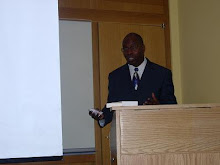In 1995 I went to The Sudan to investigate rumors and allegations of slavery. My journey to the African republic was stunning, sad, and harsh. I saw a Muslim state that respected Arab and Islamic culture more so than the value of human life. The Arab leadership attacked, massacred and enslaved survivors in the name of Islam and Allah. When my story, along with others, who decided to see modern slavery first hand, reported what we saw. American leadership voiced either indifference or disbelief. In fact, I remember a writer calling me a victim used by whites and Jews to attack Islam and Africa. Sadly, not one major leader at that time, President Bill Clinton, Congressman Charles Rangels, or Rev. Jesse Jackson, said a word about the destruction and slavery of Black life in The Sudan.
Today, 13 years later we have an eerily similar story in present day Haiti. In Haiti the first Black republic in the western hemisphere fought for the eradication of slavery and achieved a sense of self-determinism in 1804; the date of Haiti's independence. Now, after 200 years of freedom Haiti can sadly report that it is the home of over 300,000 child slaves. And, we can announce again in the United States, not one major political, social, or religious leader or organization has condemned Haiti's institution of slavery.
But, how is it that slavery exist in present day Haiti? It is very similar to the 24 million people who are enslaved globally. That is, in poor nations families often give their children away in hope for a better lifestyle for both the victim and their blood relatives. For instance, the majority of Haiti's slaves are children who originate from poor rural villages. Parents, literally, sell or give their children to "middle-class" families that live in the metropolitans of Port-au-Prince, Jacmel or Les Cayes. The idea is that these city people will educate and care for their new slave or restaveks, as they are called in Haiti.
These children who often start their service at the age of 3 years are mistreated, brutalized, and occasionally killed. They are common sights in the cities wearing ragged clothes, being feeble and malnourished while begging for food in the streets. Far too often--they are seen dying or dead on the streets from sever beatings or when abandoned by families.
But, can't the government stop the treatment? Yes, but in a strange way it's an evil tradition of the republic. The restaveks system has been around since 1804 while the current Haitian National Labor Code legalizes the practice as long as slaves are not younger than 12 years old.
Regardless, if it is legal or not it is a brutal system that must be destroyed. Children are treated worst than chattel. For example, they are beaten ed with cowhide whips, gang rapped, and murdered without remorse. Let's take the story of a boy named Rene. He testified that strikes from the whip lifted the skin and formed horrific blisters. Adding, that he was forced to knell on a bed of hot rocks while holding two large stones in each hand high above his head.
Naki, a 13 year old girl stated that her master constantly rapped her. He allowed his sons and friends to gang rape her. She said, crying, that they finished the job by rubbing hot peppers in her crotch.
Now, while the two major presidential candidates, Obama and McCain, campaign for the oval office it would be good to hear both say something of this issue. Really, if they can talk about human rights abuses in China, North Korea and Iran; they surely can say something about child slavery in the Caribbean. Well, if they don't--let's hear from the so called great voices of justice--Activist Al Sharpton, Rev. T.D. Jakes, Congresswoman Corrine Brown, Congressman Jesse Jackson, Former Attorney General of Ohio Kenneth Blackwell, Talk Show Host Tom Joyner, and Analyst Tavis Smilley to name a few.
If the above mentioned leaders can't speak on this topic--what about voices from the Haitian-American community? Perhaps, slavery in Haiti is like the peculiar institution in The Sudan. That is, both groups are poor, uneducated, their nations has little to offer the global community, and they are viewed as obsolete isolated people. The reality--Haiti is the new Sudan.
Alex Pretti is a murder victim! (*Updated*)
8 hours ago


1 comment:
My dear Vibert,
What can you say about a government that so poorly cares for its children? Unfortunately, many parents give up their children to give them a better life, but that is not what happens. It will be interesting to see if any of our elected officials takes notice.
Post a Comment